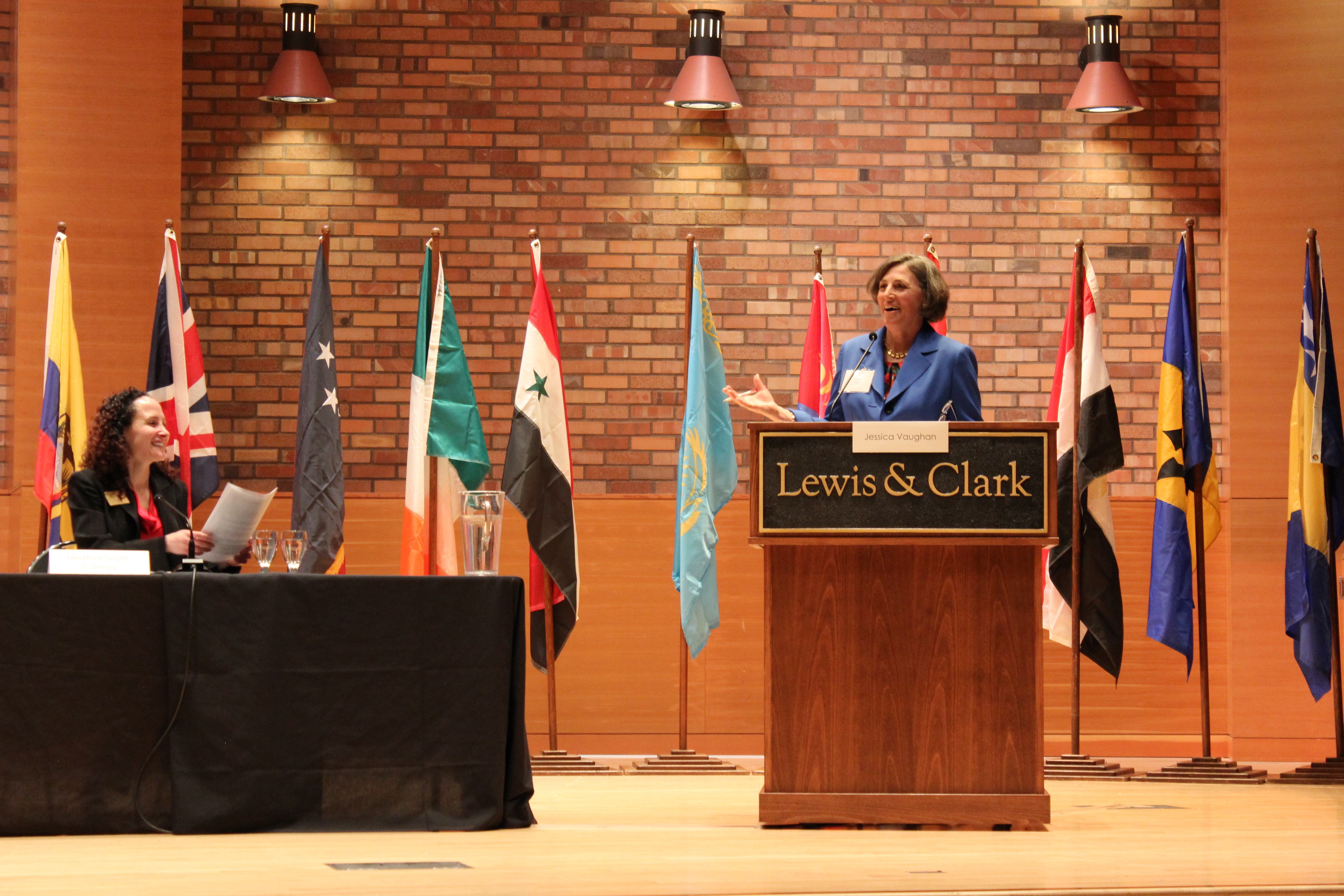
By Hanna Merzbach
Photo by Lexie Boren
The evening debate,“The Huddled Masses: Displacement in a Time of Crisis,” held on April 11, the second day of the 55th Annual International Affairs (IA) Symposium, caused great controversy throughout the Lewis & Clark and greater Portland community. The debate brought to the stage Galya Ruffer, the founder of the Center of Forced Migration Studies, and Jessica M. Vaughan, the Director of Policy Studies for the Center for Immigration Studies (CIS).
On April 7, it was brought to the attention of the IA Symposium co-chairs and the 12-person steering committee that CIS, the organization Vaughan works for, was labeled a white-nationalist hate group by the Southern Poverty Law Center. In addition, the organization has been accused of disseminating false information, some of which the Trump administration has used to back its positions on immigration.
“The entire point of the symposium is to explore alternative viewpoints on given topics and to expose Lewis & Clark students to arguments they aren’t necessarily getting from each other or on campus,” Assistant Professor of International Affairs Kyle Lascurettes said. “We are not giving the speaker a platform for her just to espouse her own position. It is a debate just like all these sessions are.”
“I implore you to please allow us to have the kind of conversation that most of the people in this community so sorely need and so sorely planned,” said Bob Mandel, Professor of International Affairs and faculty advisor for IA Symposium at the beginning of the debate. All went silent, except for the echos of the protesters chanting outside as the debate began.
Speakers were given 20 minutes to present their positions. Ruffer opened the debate.
“I think there is an important role for the United States to play in taking leadership and doing our part to show solidarity with the countries of the global south by not blocking our refugee resettlement and enabling our program to go ahead,” Ruffer said, rushing to finish her argument as she had been frequently interrupted by the noise of protesters outside.
In her argument, Vaughan agreed that the United States must play a vital role in dealing with the refugee crises. However, the two speakers’ arguments differed in that Vaughan advocated for the creation of safe-zones in the refugee’s home country rather than asylums in other countries.
“To achieve a workable, effective solution that affects as many people as possible, we need to think beyond these so-called durable solutions, especially beyond resettlement itself,” Vaughan said.
After Vaughan stated her position, moderator Heather Smith-Cannoy, Associate Professor and Chair of International Affairs, presented a question to each speaker. Prior to the debate, Smith-Cannoy described what her role as moderator would be.
“I am going to try to do the best I can to ask probing questions to both of the people that are up there on the podium,” Smith-Cannoy said to the audience. “As one of the people that teaches human rights on this campus, I think I have an ethical obligation to take very seriously the ideas that are being presented to us and subject them to the kind of scrutiny that I think we are capable of in an academic institution and that’s what I’m going to do.”
Smith-Cannoy provided statistical evidence disproving the foundation of Vaughan’s argument that refugees, and immigrants in general, negatively impact societies.
Todd Lochner, Associate Professor of Political Science, took a different approach to dismantling Vaughan’s argument, citing proof of how her organization misrepresents data. Lochner closed his argument by asking, “If you are agnostic as to if immigrants are more or less likely to commit crimes, why would you have focused on that in your testimony?”
Vaughan’s reply stated her belief that whether immigrants commit more or less crimes is unimportant. Lochner countered this by reading many of Vaughan’s Twitter posts related to this subject, leading to a debate about how Twitter works.
Before the debate took place, professor Elliot Young publicly stated his disapproval of the speaker and the IA Symposium for hosting Vaughan in a Huffington Post article. Despite Young’s disapproval of the event even taking place, he attended the debate along with members of the student body. He came prepared with a critique of Vaughan and her organization, relaying much of the evidence utilized in his previously-written Huffington Post article.
Due to the length of Lochner and Elliott’s questions, students were given little time with the microphone.
“I would like to thank Heather, the moderator, and Todd Lochner specifically for their incredible, thoughtful questions,” co-chair Neuner said. “Also, just the students. Unfortunately, we didn’t have time for more student questions, but the student questions that were heard were so thoughtful.”
Young’s Huffington Post article stirred further debate among students and faculty after the event about the importance of open discourse, engaging opposing views and professionalism in academic opposition. Senior Lecturer in Social Sciences Cyrus Partovi sent out a mass email to some IA students and certain LC faculty in response, criticizing Young for publicly “defaming” his IA students.
Lyell Asher, Associate Professor of English, responded in the email chain, “The suggestion that the IA organizing committee provided Jessica Vaughn with a ‘safe space’ is a ludicrous and defaming falsification.”
Miguel Posada ’19 released a personal statement the day following the event, stating that Elliot Young “HAD LITTLE TO NO CONSIDERATION FOR STUDENTS WHO ARE MORE DIRECTLY EFFECTED [sic].”
Subscribe to the Mossy Log Newsletter
Stay up to date with the goings-on at Lewis & Clark! Get the top stories or your favorite section delivered to your inbox whenever we release a new issue.

Leave a Reply